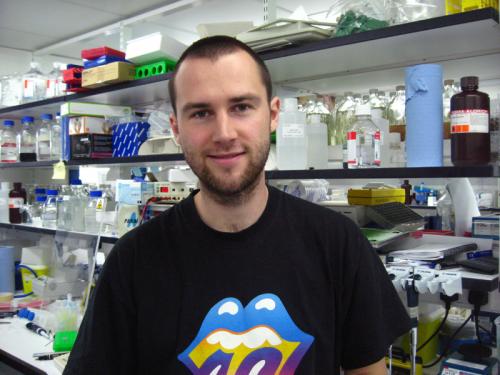
Craig MacKay wins the Howard Elder Prize
Craig MacKay from the MRC Protein Phosphorylation Unit has been awarded the 2010 Howard Elder Prize for his discovery in John Rouse's
lab of the FAN1 nuclease that acts as a 'molecular scissors' during DNA repair (MacKay et al, Cell 142, 65-76).
The Fanconi anaemia (FA) proteins are important for DNA repair. Mutations in the proteins of the FA complex result in high levels of chromosomal instability, caused by an inability to repair DNA interstrand crosslinks (ICLs), and hence predisposition to cancer. The central component of the FA pathway is FANCD2 that becomes mono–ubiquitylated at Lys561 in response to ICLs. The mono–ubiquitylation of FANCD2 is essential for ICL repair but despite much work this promotes ICL repair has remained elusive.
During his PhD with John, Craig discovered a novel UBZ domain-containing protein FAN1 that binds to, and is recruited to sites of DNA damage by, the mono–ubiquitylated form of FANCD2. Importantly, the depletion of FAN1 from human cells causes chromosome aberrations and major defects in DNA repair, similar to cells from patients with FA. FAN1 acts at the final stages of ICL repair when homologous recombination (HR) comes into play, and Craig's data show that FAN1 acts late during HR, at a point that involves the processing or 'trimming' of DNA repair intermediates. This led Craig to discover that FAN1 is a 5' flap endonuclease and his data suggest that FAN1 processes branched recombination intermediates, enabling homologous recombination to go to completion. Craig's findings at least partly explain the long-standing puzzle of how FANCD2 ubiquitylation promotes DNA repair.
Craig's FAN1 paper is has been featured in several recent News articles: (e.g. Mol. Cell 39, 167; Nat. Struct. Mol. Biol. 17, 926; Nat. Rev. Mol. Cell. Biol. 11, 603; Cell Cycle 9, 4259; Cell Cycle 9, 4261). To read a copy of Craig's paper click here
Following the completion of his Ph.D. Craig has taken up a postdoctoral position with Arno Alpi in the Scottish Institute for Cell Signaling (scills.ac.uk) at the University of Dundee, where he is working on different aspects of the Fanconi anaemia pathway.
The Howard Elder Prize was endowed 25 years ago by Dr Alison Burt in memory of her father (Dr Howard Elder, a former medical graduate of the University). The prize is awarded each year to a PhD student or postdoctoral researcher in the College of Life Sciences at the University of Dundee deemed to have published the most significant paper in an area related to cancer research. The award is accompanied by a cash prize of £500.
This is the third year in a row that an MRC Unit researcher has been awarded the Howard Elder Prize. In 2009, Elton Zeqiraj won it for his work on the structure of the LKB1 tumour supressor (to read the relevant news item click here), and in 2008 Xu Huang got the prize for his work on the role of LKB1 and AMPK in regulating tumorigenesis (to read the relevant news item click here).
lab of the FAN1 nuclease that acts as a 'molecular scissors' during DNA repair (MacKay et al, Cell 142, 65-76).
The Fanconi anaemia (FA) proteins are important for DNA repair. Mutations in the proteins of the FA complex result in high levels of chromosomal instability, caused by an inability to repair DNA interstrand crosslinks (ICLs), and hence predisposition to cancer. The central component of the FA pathway is FANCD2 that becomes mono–ubiquitylated at Lys561 in response to ICLs. The mono–ubiquitylation of FANCD2 is essential for ICL repair but despite much work this promotes ICL repair has remained elusive.
During his PhD with John, Craig discovered a novel UBZ domain-containing protein FAN1 that binds to, and is recruited to sites of DNA damage by, the mono–ubiquitylated form of FANCD2. Importantly, the depletion of FAN1 from human cells causes chromosome aberrations and major defects in DNA repair, similar to cells from patients with FA. FAN1 acts at the final stages of ICL repair when homologous recombination (HR) comes into play, and Craig's data show that FAN1 acts late during HR, at a point that involves the processing or 'trimming' of DNA repair intermediates. This led Craig to discover that FAN1 is a 5' flap endonuclease and his data suggest that FAN1 processes branched recombination intermediates, enabling homologous recombination to go to completion. Craig's findings at least partly explain the long-standing puzzle of how FANCD2 ubiquitylation promotes DNA repair.
Craig's FAN1 paper is has been featured in several recent News articles: (e.g. Mol. Cell 39, 167; Nat. Struct. Mol. Biol. 17, 926; Nat. Rev. Mol. Cell. Biol. 11, 603; Cell Cycle 9, 4259; Cell Cycle 9, 4261). To read a copy of Craig's paper click here
Following the completion of his Ph.D. Craig has taken up a postdoctoral position with Arno Alpi in the Scottish Institute for Cell Signaling (scills.ac.uk) at the University of Dundee, where he is working on different aspects of the Fanconi anaemia pathway.
The Howard Elder Prize was endowed 25 years ago by Dr Alison Burt in memory of her father (Dr Howard Elder, a former medical graduate of the University). The prize is awarded each year to a PhD student or postdoctoral researcher in the College of Life Sciences at the University of Dundee deemed to have published the most significant paper in an area related to cancer research. The award is accompanied by a cash prize of £500.
This is the third year in a row that an MRC Unit researcher has been awarded the Howard Elder Prize. In 2009, Elton Zeqiraj won it for his work on the structure of the LKB1 tumour supressor (to read the relevant news item click here), and in 2008 Xu Huang got the prize for his work on the role of LKB1 and AMPK in regulating tumorigenesis (to read the relevant news item click here).

